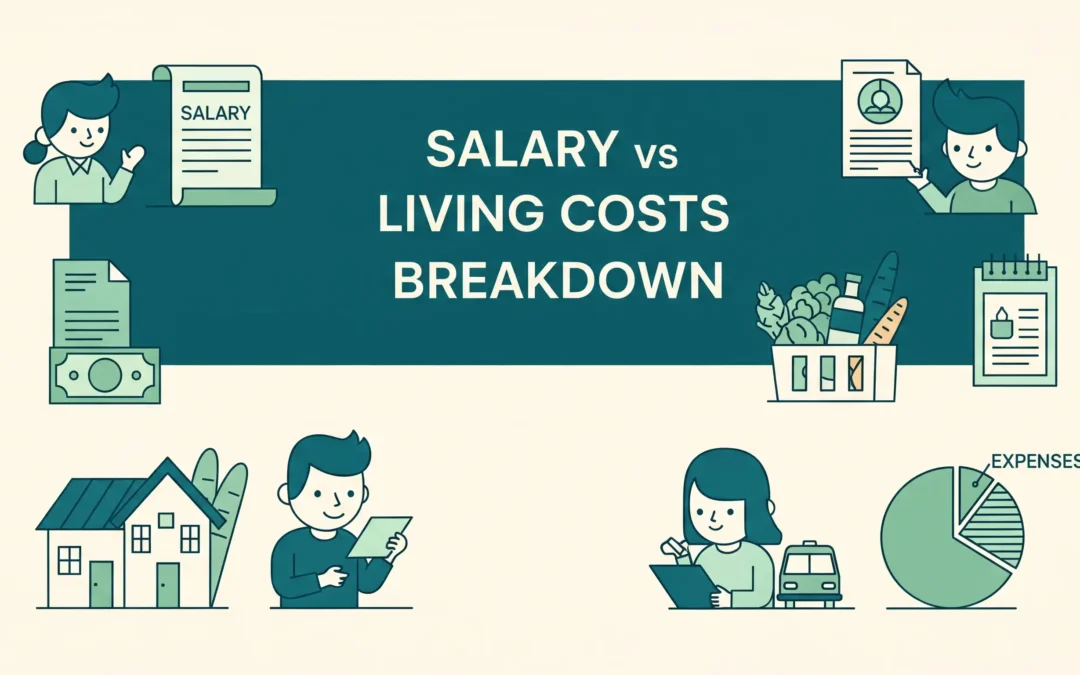Bangalore is considered the IT hub of India. It is a popular place for professionals to work in big companies or to work on their startups. But is the salary enough to cover the living costs? This question often comes to the minds of people searching for jobs in Bangalore. It is important to consider this factor to estimate the savings you will be able to make.
This article will help you understand the salary vs living cost in Bangalore. If you are planning to shift there, pay close attention to get meaningful insights.
Bangalore’s Average IT Salary
Bangalore attracts both experienced tech workers and aspiring software developers due to its status as India’s top IT hub. Along with thousands of startups and mid-sized businesses, this city is a place where multinational companies are located. Because of this diversity, your experience, skill set, company type, and even the technology you specialise in can all have a big impact on your IT salary in Bangalore.
Let us see the average salary according to the job roles:
| Experience Level | Average Salary p.a | Job Roles |
| Freshers (0 – 2 years) | Rs. 4 to Rs. 7 LPA | Software Developer, QA Tester, Support Engineer |
| Mid-Level (3 – 5 years) | Rs. 8 to Rs. 15 LPA | Backend Developer, Business Analyst, Data Analyst |
| Senior (6 – 10 years) | Rs. 18 to Rs. 30 LPA+ | Team Lead, Solution Architect, Project Manager |
| Expert (10+ years) | Rs. 35 LPA and above | Product Manager, Senior Architect, VP – Tech |
Factors Affecting the Salaries of IT Professionals
Let us understand the factors that are responsible for varying salaries among the employees:
1. Business Type
- Service-based: Although they pay less, service-based companies (such as Infosys, TCS, and Wipro) provide steady employment with planned promotion.
- Product-based companies: Salaries are high for these companies, particularly for specialised skills like Adobe, Google, and Microsoft.
- Startups: They frequently use ESOPs and performance-linked incentives to make up for their moderate fixed pay.
- Tech Stack: Developers with expertise in data science, cybersecurity, cloud computing (AWS/Azure), AI/ML, and DevOps frequently fetch higher compensation.
2. Experience and Role:
Seniority and leadership positions, like product manager, architect, or team lead, pay much more than entry-level jobs.
3. Technical Skill Set:
Better pay is frequently associated with proficiency in in-demand technologies such as AI/ML, Cloud (AWS, Azure), Data Science, DevOps, and cybersecurity.
4. Education and Certifications:
You can increase your compensation package by obtaining degrees from reputable universities and relevant certifications.
5. Performance and Negotiation Skills:
Final compensation is heavily influenced by prior performance, project impact, and successful hiring-process negotiations.
Estimated Cost of Living in Bangalore
Depending on your lifestyle, location, and personal preferences, the cost of living can vary significantly. The monthly expenses of an average IT professional are broken down here.
1. Housing and Rent
The largest portion of monthly expenses is usually housing and rent:
| Location | Estimated 1BHK Monthly Rent (Rs. ) |
| Whitefield, Electronic City | Rs. 12,000 to Rs. 25,000 |
| Indiranagar, Koramangala | Rs. 25,000 to Rs. 35,000 |
| Marathahalli, BTM Layout | Rs. 15,000 to Rs. 30,000 |
2. Essential Services and Utilities
These consist of DTH/mobile recharges, broadband, cooking gas, water, and electricity.
- Monthly electricity costs range from Rs. 500 to Rs. 1,200, with the price going up if air conditioning or geysers are used frequently.
- High-speed broadband internet costs between Rs. 600 and Rs. 1,000 per month.
- Rs. 300 to Rs. 800 for water and maintenance, which is usually included in rent
- Rs. 300 to Rs. 600 per month for mobile recharges
3. Groceries and Food
- Meals prepared at home (for one person): Rs. 6,000 to Rs. 8,000 per month
- Sometimes eating out costs between Rs. 2,000 and Rs. 4,000 per month.
- Depending on frequency, using Swiggy or Zomato can increase monthly expenses by Rs. 3,000 to Rs. 6,000.
4. Transportation
Despite the heavy traffic, Bangalore has a decent combination of private and public transport.
| Mode of Transport | Monthly Cost (Rs. ) |
| BMTC Buses/Metro | Rs. 1,000 to Rs. 1,500 |
| Own Bike (Fuel + Parking) | Rs. 2,500 to Rs. 3,500 |
| Cabs/Auto | Rs. 3,000 to Rs. 6,000 |
5. Entertainment & Lifestyle
- Bangalore provides a lively way of life with its cafes, bars, shops, weekend escapes, and fitness centres.
- Shopping, café hopping, and other such activities can cause up to Rs. 8,000 to Rs. 10,000 monthly.
Is It Sustainable Financially?
Depending on lifestyle, savings in Bangalore can vary greatly, even with a monthly salary of Rs. 70,000. A premium lifestyle can save as little as Rs. 5,000, while conservative spenders can save up to Rs. 35,000. Making the most of your income requires careful budgeting.
| Scenario | Monthly Income (Rs. ) | Monthly Expenses (Rs. ) | Monthly Savings (Rs. ) | Yearly Savings (Rs. ) |
| Conservative Lifestyle (shared housing, home-cooked meals) | Rs. 70,000 | Rs. 35,000 | Rs. 35,000 | Rs. 4,20,000 |
| Moderate Lifestyle (1BHK in a mid-range area, mix of dine-in/out) | Rs. 70,000 | Rs. 50,000 | Rs. 20,000 | Rs. 2,40,000 |
| Premium Lifestyle (prime locality, frequent dining out, travel) | Rs. 70,000 | Rs. 65,000 | Rs. 5,000 | Rs. 60,000 |
Bottomline
The conclusion can be drawn that the living cost is comparatively higher in Bangalore as compared to other cities. However, IT professionals earn a good amount to manage the expenses. But budgeting plays an important role in spending the least possible amount and saving the rest.
An individual with no budget may spend a huge amount without acknowledging while the other individual with earning same earnings who follows a budget may build wealth in the long run.


